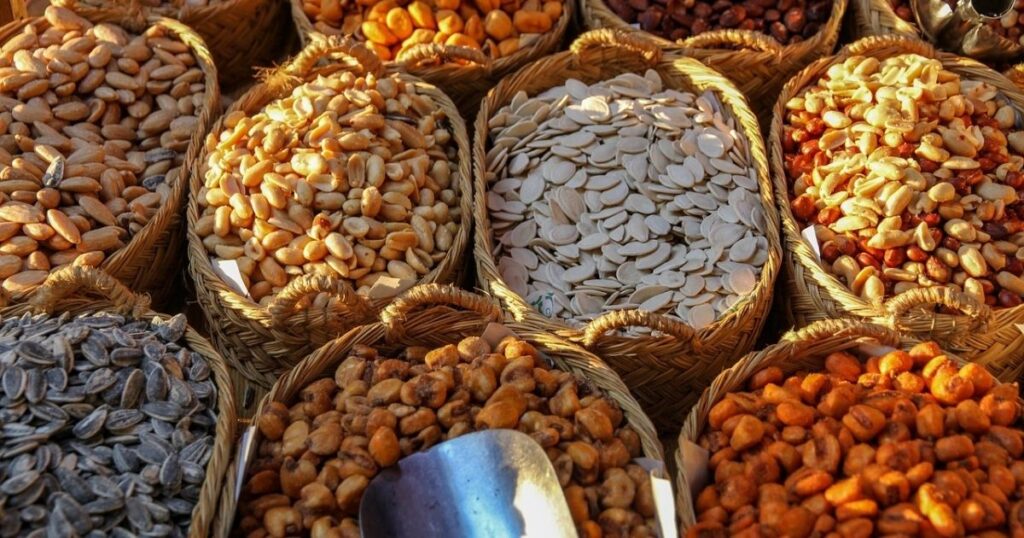Seeds, despite their small in size, are known to be extremely nutritious. They are known to be a nutrient powerhouse and can be consumed on a regular basis for a variety of health benefits. They might assist you in losing weight while also supplying you with sufficient energy for the entire day.
Seeds are considered to be incredibly adaptable, including a high quantity of fiber, fats, vitamins, minerals, and antioxidants, and can be used in a variety of ways in any recipe.
Seeds can help lower blood sugar, cholesterol, blood pressure and improve your digestive health when taken as part of a healthy diet.
As individuals become more aware of the benefits of these seeds, more people are deciding to consume them for improved health.
Here are some of the healthiest seeds you can take daily for healthy diet.
6 super Healthiest seeds for daily Diet
#1 Pumpkin Seeds

Pumpkin seeds are one of the most popular varieties of seeds. They provide more than 8 gr. of protein per ounce (28-gram) and are high in magnesium, phosphorus, monounsaturated fats, and omega-6 fats, which may aid the heart health and urinary problems.
Pumpkin seeds are also high in phytosterols, which are plant components that may help lower blood cholesterol levels.
Pumpkin seed oil may assist men with enlarged prostates minimize the symptoms of overactive bladder and enhance their quality of life.
Pumpkin seed oil was also proven to lower blood pressure, boost “good” HDL cholesterol, and relieve menopause symptoms in a trial of postmenopausal women.
Nutritional Values of Pumpkin Seeds (28g or One Ounce)
- Calories: 151
- Fat: 12.8 g
- Sodium: 5mg
- Carbohydrates: 5g
- Fiber: 2g
- Protein: 6.9g
Best way to consume pumpkin seeds
Roasting pumpkin seeds and eating them as a snack is the best way to enjoy.
These seeds can also be drizzled over Yoghurt, Salads with fruits, Soups, Cereals and Blend with smoothies.
#2 Sunflower Seeds

Sunflower seeds are high in monounsaturated fatty acids, vitamin E, and proteins. In middle-aged and older persons, sunflower seeds lowered inflammation and cholesterol levels, effectively reducing the risk of heart disease.
The sunflower seed diet lowered triglycerides in the blood, Triglycerides are a form of fat in the blood that has been linked to heart disease. Also sunflower seeds good for diabetics.
Nutritional Values of sunflower Seeds (28g or One Ounce)
- Calories: 164
- Carbohydrates- 5.6 g
- Fiber: 2.4 grams
- Protein: 5.8 grams
- Fat: 14 grams
- Vitamins E- 9.3 mg
According to a study, one ounce of the seeds contains only 164 calories, therefore your calorie intake won’t be much increased.
Best way to consume Sunflower seeds
Sunflower seeds, roasted or salted, are a healthy snack option. You can use them to add fat to your breakfast cereals to make them more nutritious.
Sunflower powder or flour can be used in cake batters, muffin batters, and bread batters. The nutritional value will be considerably improved as a result of this.
You may also use them to make chutneys at home.
To add flavor and nutrition to any main course dish, such as chicken curry or mixed vegetables, sunflower seeds can be sprinkled over healthy salads and pastas.
#3 Chia Seeds

Chia seeds are high in fiber and omega-3 fats, as well as a variety of other nutrients.
Chia seeds include 10 gr. of fiber per ounce! These seeds aid in the reduction of cholesterol levels. Not only that, but they can also help with constipation.
It aids in the treatment of cardiovascular disorders, blood sugar control, and even cancer!
Chia seeds are high in polyphenols, which are powerful antioxidants. Also chia seeds is good for weight loss.
Interestingly a number of studies mention that, consuming chia seeds has been proven to raise Alpha Linolenic acid (ALA) levels in the blood. ALA is an essential omega-3 fatty acid that can help with inflammation reduction.
Nutritional Values of sunflower Seeds (28g or One Ounce)
- Calories: 137
- Carbohydrates- 12.3 grams
- Fiber: 10.6 grams
- Protein: 4.4 grams
- Monounsaturated fat: 0.6 grams
- Fats- 8. 6 grams
Best way to consume Chia seeds
Chia seeds are versatile and offer a long list of health advantages! Before eating them, you can soak them or sprout them. You can consume or sprinkle raw seeds also, in a glass of juice or salad.
You can eat them raw. They can also be used as a garnish because of their delicate nutty flavor.
#4 Flax Seeds

Flaxseeds, also called linseeds, are high in fiber, omega-3 fats, and a variety of other nutrients, including alpha-linolenic acid (ALA).
Flaxseed is high in thiamine, a B vitamin that is crucial for energy metabolism and cell function. This fruit is high in copper, which is crucial for brain development, immune function, and iron metabolism.
The omega-3 fats, on the other hand, are found in the seed’s fibrous outer shell, which is hard for humans to digest.
As a result, if you want to boost your omega-3 levels, it’s preferable to eat ground flaxseeds.
Flaxseeds also include a variety of polyphenols, particularly lignans, which are powerful antioxidants in the body.
Lignans, as well as the fiber and omega-3 fats found in flaxseeds, can help lower cholesterol and other cardiac risk factors.
Nutritional Values of Flax Seeds (28g or One Ounce)
- Calories: 150
- Carbohydrate- 8.1 g
- Fiber: 7.8 grams
- Protein: 5.2 grams
- Fats: 11.8 grams
Best way to consume Flax Seeds
Salads, baked products, pancakes, crackers, smoothies, and other dishes can all benefit from the addition of whole flaxseeds.
The ideal approach to consume flaxseeds is to grind them, as this makes them simpler to digest. Ground flaxseeds can be used in a variety of dishes, including paranthas, pooris, chutneys, biscuits, muffins, and bread.
Flaxseed oil, powder, pill, capsule, or flour are all ways to take flaxseeds.
#5 Watermelon Seeds

Water melon is a hydrating fruit that is high in essential minerals and vitamins and typically contains 92 percent water.
Did you know, however, that the little black seeds inside the massive watermelon fruit have certain mystical properties?
Watermelon seeds, among other minerals, are high in folate, iron, zinc, copper, magnesium, and potassium. Proteins, Amino acids and the vitamin B complex are rich in these seeds, making them extremely nutritious. All of these nutrients improve your body’s metabolism by working together.
It’s good for your heart and immune system. It strengthens your bones. There is no unhealthy fat, Diabetics will benefit from it.
Nutritional Values of Watermelon Seeds (28g or One Ounce)
- Calories: 156
- Carbohydrate- 4.3 g
- Protein: 7.9 grams
- Folate: 16.2 mcg
- Fats: 13.8 grams
Best way to consume Watermelon seeds
Watermelon seeds can be eaten raw, sprouted, or roasted. In any form, these seeds are delicious and healthful. Watermelon seeds are usually given nutrients once they have sprouted.
#6 Sesame Seeds

Sesame (Sesamum indicum), sometimes known as Til, is a popular food in Asia and Western countries.
Like flaxseeds, sesame seeds are strong in lignans, particularly sesamin. In fact, the most well-known dietary source of lignans is sesame seeds.
Sesame seeds may help to balance the sex hormones estrogen. Sesame seeds may also help to reduce inflammation and oxidative stress.
Nutritional Values of Sesame Seeds (28g or One Ounce)
- Calories: 176
- Carbohydrate- 3.3 g
- Protein: 7.9 grams
- Sodium: 13mg
- Fats: 17 grams
Best way to consume sesame seeds
Sesame seeds can be used in a variety of ways. They can, for example, sprinkle the seeds on salads, stir-fries, or soups.
To make sesame seeds crunchier and more flavorful, they can be roasted. Sesame seeds can be toasted by spreading them out on a baking pan and roasting them.
Sesame seeds can also be found in bread, crackers, and cereal bars, which can be baked or purchased.
The Bottom Line
Seeds are high in healthy fats, vegetarian protein, fiber, and antioxidant polyphenols, all of which are beneficial to your health.
They can also assist to lower the risk of certain diseases. Lignans found in certain seeds, in particular, may reduce cholesterol and cancer risk.
Seeds are a simple method to add healthy nutrients to your diet and may be easily added to salads, yoghurt, cereal, and smoothies.










